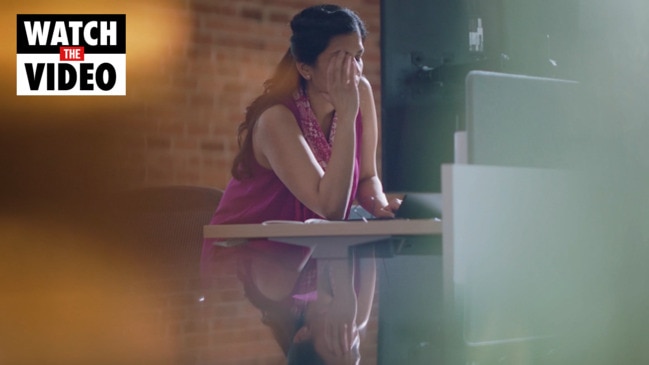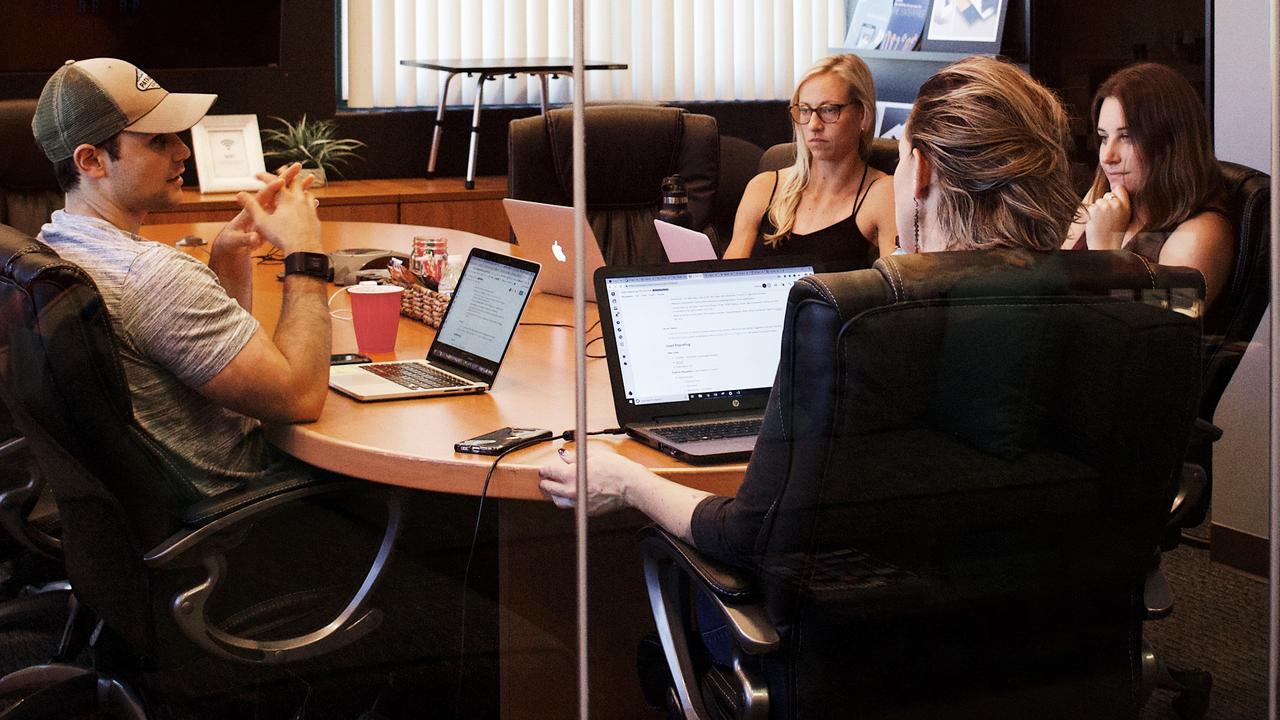Australians to go beyond ‘quiet quitting’ with 2m set to leave jobs
Australians are fed up in the workplace – hit by burnout – and ‘quiet quitting’ isn’t enough. One woman took an $80,000 pay cut after becoming “desperate”.

The Great Resignation is set to slam Australian workplaces in the next six to 12 months with 2 million people ready to quit their jobs, new research exclusively revealed by news.com.au showed.
It showed an incredibly unhappy workforce is barely able to stomach staying with their current employer.
Job satisfaction has plummeted as 42 per cent of Aussies are experiencing fatigue and burnout, while 34 per cent have been hit by increased work loads due to staff shortages and a failure to replace lost employees, the research from insurer Allianz Australia showed.
Melanie* is one Australian who experienced such severe burnout that she quit her job with nothing else lined up.
The 45-year-old had been in her sales manager role for seven years but when the pandemic hit she felt like “work didn’t ever turn off”.
She was putting in an extra two to three hours a day but endless meetings sent her to “breaking point”, along with looking after her team with no support from above.
“People would pop appointments in my diary back to back and I would end up with eight one hour appointments and find myself just literally running in between appointments to get something to eat or go to the bathroom. That was really a stressful thing to suddenly have these days with literally no breaks,” she told news.com.au.
“The thing that really burnt me out was trying to help everyone too much. I am a pretty caring person and a caring manager and I just really got quite involved in making sure everyone was OK, that is definitely one of the reasons I got burnout.
“I felt absolutely exhausted, it wasn’t even the work, it was the stress and how worried everyone was on whether we would keep our jobs. It was a really intense time.”
Have a similar story? Continue the conversation sarah.sharples@news.com.au


‘Desperate move’
The South Australian ended up unwell with auto immune symptoms and she was forced to recognise she had reached her limit. She decided she had to make a “risky move”.
“I actually quit before I figured out what to do next, which is a pretty desperate move,” she revealed.
“I found I couldn’t cope anymore with the stresses of myself and the team.”
She spent seven months off and recently returned to part-time work as she is still recovering from the physical and mental impacts of burnout.
It has seen her leave sales and move into a training role and has also meant taking an eye-watering pay cut.
“I used to be on about $150,000 to $190,000 depending on commission and currently if I work full time I would be on $100,000 it was at least an $80,000 pay cut that I took but it seemed to be worth it,” she said.
It’s a “shame" that people have to ”completely break” before changing things and she urges Aussies to take a step back from work before it’s too late.
However, it wasn’t just burnout sending Aussies job hunting. They were also fed up with being badly paid with almost a third citing it as one of the main reasons they are looking to leave, the research found
Want to stream your news? Flash lets you stream 25+ news channels in 1 place. New to Flash? Try 1 month free. Offer ends 31 October, 2022 >

The Workplace Wave
But Julie Mitchell, chief general manager of personal injury at Allianz Australia said the trend playing out is broader than the Great Resignation, in a term coined as The Workplace Wave.
The trend is defined by isolation from colleagues and managers, issues with high staff turnover, a lack of flexibility and employees feeling increasingly unsatisfied with the role of work in their lives forcing them to look for a new job.
It is also characterised by employees remaining dissatisfied with the proportion of time they spend working each day, which is exacerbated by managers failing to recognise overloaded staff, and a mentally unhealthy workplace.

This means Australian workplaces face a “real risk” with the huge number of people intending to quit their jobs, she added.
“Despite emerging from the depths of the pandemic, the disruption to workplaces has not subsided. Employees have emerged with refreshed values and a change in how they are approaching work, prompting the emergence of concepts like ‘the right to disconnect’, ‘loud leaving’, ‘quiet quitting’, and ‘acting your wage’,” she said.
“These trends are all real-world examples of The Workplace Wave, and organisations unequipped to effectively respond are likely to experience the full effects – being increased employee turnover, employee disengagement, and in some instances, a mental health workers compensation claim.”

‘Acting your wage’
‘The right to disconnect’ and ‘acting your wage’ is particularly playing out among younger generations, Ms Mitchell added.
“I think its really interesting about the generational differences we areas seeing playing out in the workplace in particular our Gen Z populations think it’s important working hours are set according to what they are paid for, whereas Gen X and Boomers are happy to work the hours that are required to get the job done,” she told news.com.au.

But managers will alienate staff if they don’t demonstrate their own boundaries in terms of time in the workplace, she explained.
“Loud leaving is really something that speaks to the importance of having the right tone from the top of the organisation around mental health and reducing the stigma around mental health, so it’s about having leaders talk about their own situations and challenges they are experiencing,” she revealed.
“It’s also about the senior most person leaving to take a break or telling people about their need to leave at 4pm today to pick up children and it’s about letting the workplace know its OK to leave and … it’s something that’s a very powerful symbol that leaders can drive to make sure workplaces are mentally healthy.”

Increase in mental health claims
While more than half of managers believe their company has gone above and beyond to provide support and systems to create mentally healthy workplaces, the data showed otherwise.
Allianz figures revealed there was a 19 per cent increase in the days taken off work from mental health claims in the last three years.
Ms Mitchell said the rise in mental health claims with one of the key causes being workload pressure.
“Our trend has shown that the incidences of mental health claims continue to rise and we think that trend will continue,” she added.
The Great Resignation, which saw millions of people in the US ditch their jobs from the executive level down to retail workers in 2021, emerged in Australia over the past year.
Almost 10 per cent of the Australian workforce quit their jobs last year – a whopping 1.3 million people, according to the Australian Bureau of Statistics, which was the biggest number of Aussies changing jobs since 2012.
*Name has been changed for privacy reasons






